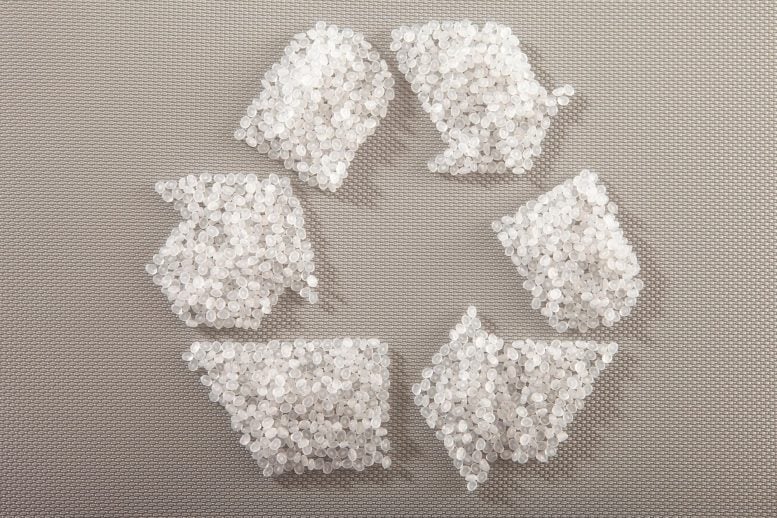
Posted on 10/07/2024 5:54:29 AM PDT by Red Badger

Scientists have invented tough, chemically recyclable polymers that maintain high performance under stress but can be precisely broken down and reused with no loss in quality. Their method uses a metal catalyst to trigger decomposition, potentially revolutionizing plastic recycling.
===================================================================
Researchers at Osaka University have developed a new type of polymer that marries the toughness needed for demanding applications with the ability to be easily recycled into like-new material.
Using a unique directing group that acts under specific conditions, this polymer withstands harsh environments yet breaks down effortlessly in the presence of a nickel catalyst. This innovation could make plastics indefinitely recyclable without degrading their quality, promising a significant reduction in plastic pollution.
Revolutionizing Plastic Recycling
Plastics are foundational to modern life, essential in fields such as medicine, technology, and food safety, where their beneficial properties are irreplaceable. Yet, the very durability that makes plastics valuable also renders them problematic pollutants and challenging to recycle. The key to addressing this critical issue lies in developing more easily recyclable plastics.
In a study published today (October 7) in the journal Chemical Science, researchers at Osaka University have found a way to make tough, high-performance polymers, the main component of plastics, that can be broken down easily and precisely into their component parts and recycled into materials that are like new.
Strengthening and Recycling Polymers
The main component of plastics are molecules called polymers, which are long chains of small repeating units called monomers. Current physical recycling simply reuses the polymers without breaking them down, and the recycled plastic is usually worse than the original. Chemical recycling is a newer method that breaks the polymer chains back down into their monomer units and then strings the units back together. The recycled plastic is as good as new. However, the polymers designed for chemical recycling are usually weak because they have weak links between the monomer units so that it is easy to break the chains up.
The researchers have developed a way to make tough, chemically recyclable polymers without compromising on heat and chemical resistance. This breakthrough could hugely expand the uses of chemically recyclable polymers.

New robust polymers that are chemically recyclable. Introducing a directing group enables catalytic cleavage of strong chemical bonds, allowing controlled degradation of robust polymers into monomers. Credit: Mamoru Tobisu, Osaka University
===================================================================================
A New Era in Polymer Technology
“We knew that we needed to make the links between the monomers really strong in harsh environments but easily broken under specific conditions for recycling,” says lead author Satoshi Ogawa. “We were surprised to find that no one had tried including a directing group, which would break the strong links only in the presence of a metal catalyst.”
The directing group is like a lock on the link, only opening the link when the right key is present. The polymers stood up to high temperatures and harsh chemicals, but when it came to recycling, a nickel catalyst acted like a key, and the directing group opened the links easily, releasing the monomers. The original polymer could then be reassembled from the monomers.
Toward Sustainable Plastic Solutions
“It’s a huge step forward to make a polymer this tough that can be broken down easily and precisely and recycled into a pristine material in so few steps,” explains senior author Mamoru Tobisu. “This revolutionary design could be used in making high-performance polymers that can be recycled indefinitely with no loss of quality.”
The team’s work shows that there doesn’t have to be a tradeoff between performance and recyclability. Their design could be used in lots of other polymers to make many types of plastic chemically recyclable, potentially helping to consign plastic pollution to the trash can of history.
Reference:
“Controlled Degradation of Chemically Stable Poly(aryl ethers) via Directing Group-Assisted Catalysis” 7 October 2024, Chemical Science.
DOI: 10.1039/d4sc04147j
Only 10 years away! (While supplies last).
The big question is: will it be cheaper to recycle the material, or to make fresh material?
Good question.................
Wonder why they banned Scotch guard.
It was hurting sales of Tide..............
“super-fantastic-elastic-plastic” already exists. it’s called Politicians!
That’s Cher’s plastic surgeon’s material..................
Hmmmmmm! Where do the “ingredients” come from? How are they processed? We know the drill.......
But, I did notice the word ‘cleavage’ used.......
How do you keep this trash separate from other trash so it can be recycled ?
We have two garbage cans provided by the county. One with a green lid is for regular garbage and the other has a yellow lid is for recyclables: metal, plastic, glass etc.
Pick-up is on different days for both...........
It can’t be destroyed if it gets in the lungs they don’t know what it will do it lasts forever no matter where it’s used.
Regulations can always fix bad economics.
“””””maintain high performance under stress but can be precisely broken down and reused with no loss in quality.”””””
Ahhh... romance in your early 20s.
"They" didn't ban Scotchguard.
When 3M discovered that the active ingredient didn't break down in the environment, out of an abundance of caution, 3M took it upon themselves to pull it from the market.
Although the chemical had no known environmental risk, the concern was that should one surface, there would be no way to remove it from the environment.
This is what corporate responsibility and good citizenship looks like, folks!
Don't be a boob.
};^P>

😂. I was trolling to see if Laz would respond. 👍
Active ingredient didn’t break down in the environment
3M took it upon themselves
corporate responsibility and good citizenship looks like, folks!
NOPE it’s now you beat the flood of lawyers and losing the business.
Disclaimer: Opinions posted on Free Republic are those of the individual posters and do not necessarily represent the opinion of Free Republic or its management. All materials posted herein are protected by copyright law and the exemption for fair use of copyrighted works.